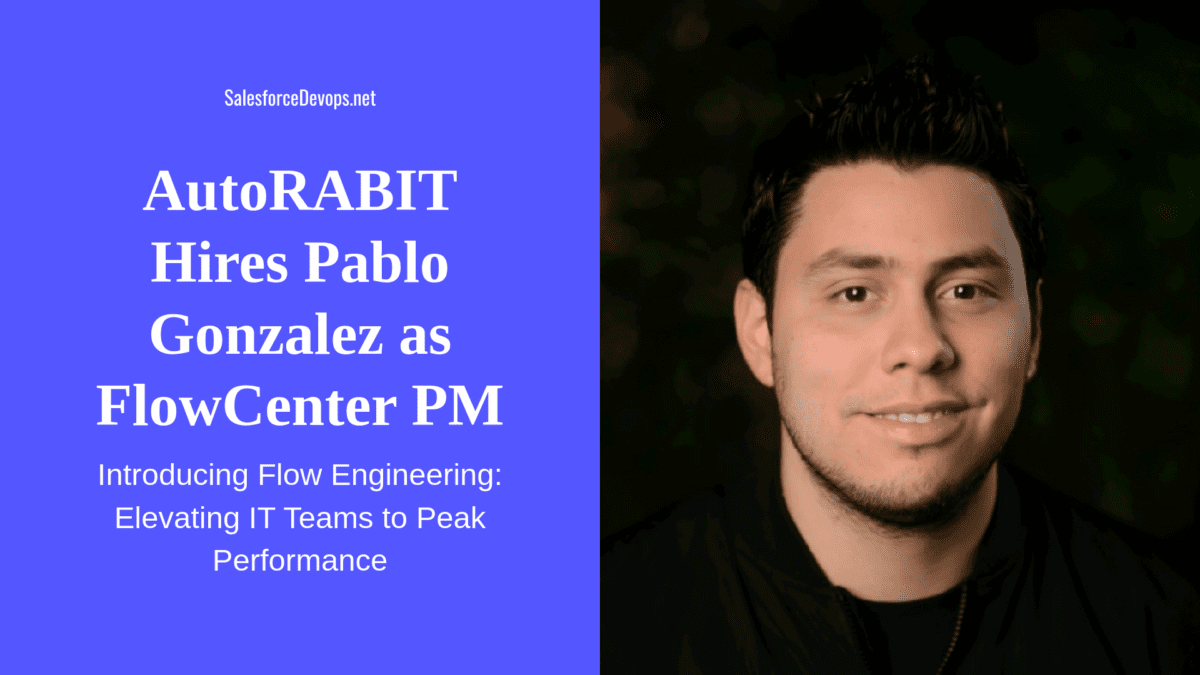AutoRABIT Hires Pablo Gonzalez as FlowCenter PM
The Salesforce devops community was abuzz last week with the news that Pablo Gonzalez, the top industry influencer in Salesforce devops, has joined AutoRABIT. He will be reporting to Andrew Davis, who was recently named AutoRABIT Chief Product Officer. At AutoRABIT, Gonzalez will be taking over as product manager for AutoRABIT FlowCenter with the title Director of Product Management.
Coincidentally, Davis is also publishing a new book, entitled Flow Engineering: From Value Stream Mapping to Effective Action. Davis and his co-author Steve Pereira seek to give IT pros ways to better orchestrate teamwork in large organizations.
So, with a new book coming out, and a new focus on Gonzalez and FlowCenter, SalesforceDevops.net interviewed Davis about his new book, FlowCenter, and getting some help with his new product vision.
Table of contents
What is Flow?
In the world of professional sports, moments of sheer brilliance are often attributed to athletes entering a “flow state,” or “the zone” where skill, focus, and timing converge to produce performances that captivate and inspire.
Consider the likes of Steph Curry and Lionel Messi; their ability to transcend the ordinary and achieve greatness on the field or court. It is not just about individual talent but also about creating synergy with teammates, elevating the entire team’s performance. This phenomenon of shared excellence and collective achievement offers a glimpse of what’s possible when every element aligns perfectly.
Contrast this with the daily grind faced by many in the IT sector. This is where the joy of seamless collaboration and the thrill of breakthroughs are often overshadowed by frustration, stagnation, and a sense of isolation. The dread of yet another day battling against disjointed processes and unclear objectives is a far cry from the euphoria witnessed on the sports field.
However, what if the principles that allow athletes to achieve and sustain their flow state could be applied to the IT workplace? Enter Flow Engineering, a revolutionary approach aimed at recapturing the essence of what makes teams in sports so successful: the creation of an environment where individuals not only excel in their roles but do so in a way that lifts the entire team.
In much the same way the 2016-17 Golden State Warriors and the 2022 Argentina national football team have demonstrated, Flow Engineering in the IT sector is about fostering an unparalleled level of synergy and collaboration within teams. These sports teams exemplify how individual talents, when harmoniously aligned towards a common goal, can transcend personal achievement to reach historic levels of collective success. Flow Engineering applies this ethos to the workplace, aiming to cultivate an environment where every team member can experience their own “flow state,” while simultaneously contributing to an ecosystem of shared success. It’s about transforming the IT workspace into a field where each “player” knows their role, trusts in their teammates, and together, achieves outcomes greater than the sum of their parts.
Davis observed: “The most impactful creative work emerges when individuals achieve a flow state, which extends into collective and organizational flow. This is characterized by seamless process handoffs, mirroring a sports team’s coordinated effort where every player contributes to the victory. Just as in basketball, where a sequence of passes and plays by multiple players culminates in a score, organizational success in the IT world relies on such team flow. Achieving this requires practice and a commitment to learning, ensuring smooth transitions in the workflow, akin to not dropping the ball. Value stream mapping plays a crucial role in facilitating these smooth handoffs, embodying the principle of team synergy that leads to success.”
What is AutoRABIT FlowCenter?
Announced September 2023, AutoRABIT FlowCenter’s key function is to provide a visual, user-friendly interface to manage and streamline Salesforce development pipelines. It integrates with other AutoRABIT products like ARM (Automated Release Management), CodeScan (code quality analysis), and Vault (data backup and recovery).
FlowCenter works to simplify Salesforce devops using drag-and-drop pipelines for easy visualization of development stages. It consolidates the user experience for its other tools, creating a hub-like experience.
Besides pipeline orchestration, FlowCenter delivers insights and metrics to help optimize processes, identify bottlenecks, and make data-driven decisions. And FlowCenter helps ensure that secure and clean code moves into production environments, bolstering DevSecOps practices.
Davis said “AutoRABIT FlowCenter is envisioned as a straightforward and efficient pipeline tool, designed to facilitate the transition from development to production. It encompasses pipeline capabilities essential for deploying changes, complemented by a layer of insights and analytics. This dual focus not only streamlines the deployment process but also provides valuable feedback to optimize operations.
“The essence of FlowCenter lies in enhancing the flow through intuitive user interfaces and automation, while simultaneously offering feedback mechanisms to ensure continuous improvement and alignment with the devops principles of flow and feedback. By doing so, FlowCenter aims to simplify Salesforce devops, making it more accessible and effective for users,” added Davis.
Building The Dream Team
The incorporation of Gonzalez into the AutoRABIT team will reverberate throughout the global Salesforce Trailblazer community. Known for his influential presence in the Salesforce devops community, particularly on LinkedIn, Gonzalez’s role will focus on leveraging his extensive knowledge and network to bolster AutoRABIT’s market position and product strategy.
According to Davis, Gonzalez’s primary responsibilities will include driving innovation within AutoRABIT’s product suite, particularly the newly announced AutoRABIT FlowCenter, and engaging with the Salesforce devops community to gather insights and feedback that shape future product developments. His expertise and influence are expected to play a pivotal role in AutoRABIT’s efforts to simplify Salesforce application development practices, ensuring the delivery of secure, high-quality code, and enhancing the overall user experience with AutoRABIT’s offerings.
This move by Davis strategically enhances AutoRABIT’s leadership and operational dynamics. The strategic addition of Gonzalez to the team marks a significant step in Davis’s vision to solidify AutoRABIT’s leadership in the Salesforce ecosystem, aiming for a synergistic approach to product development and community engagement.






